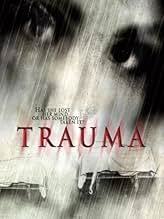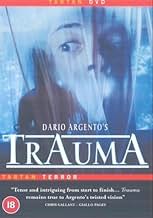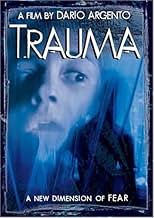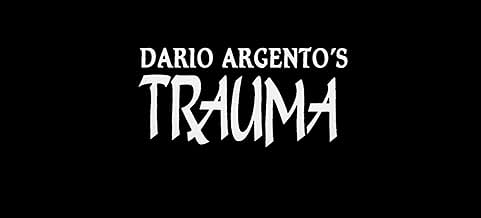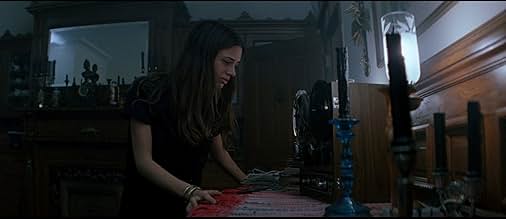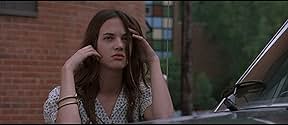CALIFICACIÓN DE IMDb
5.8/10
8.6 k
TU CALIFICACIÓN
Un joven intenta ayudar a una adolescente a encontrar al asesino en serie que asesinó a sus padres antes de que el asesino los persiga.Un joven intenta ayudar a una adolescente a encontrar al asesino en serie que asesinó a sus padres antes de que el asesino los persiga.Un joven intenta ayudar a una adolescente a encontrar al asesino en serie que asesinó a sus padres antes de que el asesino los persiga.
- Dirección
- Guionistas
- Elenco
- Premios
- 2 nominaciones en total
Isabell O'Connor
- Georgia Jackson
- (as Isabell Monk)
Opiniones destacadas
(***1/2 out of *****)
This shot-in-Minnesota Argento mystery-thriller never gets the credit it deserves. So it's not as flashy and deliriously twisted as some of the Italian master's earlier work -- so what. It relies more on creating people you actually care about and, for this reason, I think it's one of his most character-driven films. Argento's real-life daughter (and European sex symbol) Asia Argento plays a young anorexic who witnesses the decapitation murder of her parents by a serial killer known as `The Head Hunter' who only kills when it's raining. With the help of a local TV news writer (Christopher Rydell), who is himself a recovering drug addict, she tries to solve the murders and reveal the killer's identity before he/she kills again. Although it's not quite as lavish as, say, Suspiria or Opera, there are some typically inventive touches that raise this above other early-90s slasher movies of its kind (for example, the killer uses a mechanical device with a razor-sharp wire to decapitate victims, and some heads continue to move and even speak for a few seconds after they've been cut off.) A great oddball cast (including eccentric character actor Brad Dourif, Frederic Forrest as the suspicious, unconventional doc, and Piper Laurie as Asia's batty, phony-medium mom) make it even more enjoyable -- but, honestly, this movie has one of the most unusual and seemingly out-of-place opening and closing credits sequences of any movie I've ever seen.
HIGHLIGHT: When the wire on the decapitation device snags on Dourif's necklace, the unruffled killer compensates by dragging him over to an elevator shaft and pushing his head under the descending elevator car.
This shot-in-Minnesota Argento mystery-thriller never gets the credit it deserves. So it's not as flashy and deliriously twisted as some of the Italian master's earlier work -- so what. It relies more on creating people you actually care about and, for this reason, I think it's one of his most character-driven films. Argento's real-life daughter (and European sex symbol) Asia Argento plays a young anorexic who witnesses the decapitation murder of her parents by a serial killer known as `The Head Hunter' who only kills when it's raining. With the help of a local TV news writer (Christopher Rydell), who is himself a recovering drug addict, she tries to solve the murders and reveal the killer's identity before he/she kills again. Although it's not quite as lavish as, say, Suspiria or Opera, there are some typically inventive touches that raise this above other early-90s slasher movies of its kind (for example, the killer uses a mechanical device with a razor-sharp wire to decapitate victims, and some heads continue to move and even speak for a few seconds after they've been cut off.) A great oddball cast (including eccentric character actor Brad Dourif, Frederic Forrest as the suspicious, unconventional doc, and Piper Laurie as Asia's batty, phony-medium mom) make it even more enjoyable -- but, honestly, this movie has one of the most unusual and seemingly out-of-place opening and closing credits sequences of any movie I've ever seen.
HIGHLIGHT: When the wire on the decapitation device snags on Dourif's necklace, the unruffled killer compensates by dragging him over to an elevator shaft and pushing his head under the descending elevator car.
TRAUMA
Aspect ratio: 2.39:1 (Technovision)
Sound format: Dolby Stereo
A TV newsroom artist (Mark Rydell) helps a distraught anorexic (Asia Argento) to investigate the death of Argento's mother (Piper Laurie) at the hands of a monstrous serial killer.
Though often cited as the film which signalled a creative downturn in Dario Argento's career, TRAUMA is actually a much better entry than its reputation suggests. The victim of spotty theatrical distribution and horrendous pan-scanned video versions - which reduce the wide Technovision frame to a mere shadow of its former self - the film is an exercise in giallo excess, culminating in one of the finest Grand Guignol set-pieces of this director's long career. Indeed, far from providing evidence of 'creative decline', TRAUMA is actually a fine addition to Argento's filmography, and is ripe for reappraisal.
Despite its American setting, the film is defiantly European in style and execution, employing ultra-wide scope framing, inventive camera-work (including a bizarre shot from the point-of-view of a butterfly!!), ornate narrative structure and eccentric characterizations. It's no wonder some of the supporting American players seem a little disconcerted by the director's unconventional approach (including Frederic Forrest as a doctor sporting an unexplained neck-brace, and James Russo as a typically hard-boiled cop, always one step behind the film's youthful protagonists)! And the script - co-written by Argento and celebrated fantasy author T.E.D. Klein - adheres faithfully to the giallo template, punctuating its convoluted storyline with several grisly murders (though not *that* grisly, considering the involvement of makeup wiz Tom Savini), and a number of compelling set-pieces: The seance which ends in murder; the mental institution where the killer disposes of an important 'clue'; the room full of billowing drapes (an authentic stroke of genius); and the climactic revelation of the killer's motive, which is so utterly horrific, it almost justifies his/her gruesome rampage. The movie ain't called TRAUMA for nothing!
At least two other versions of the film have surfaced in bootleg video form over the years, both of which plug a number of gaping editorial gaps in the official 'director's cut' (note, for instance, the abrupt introduction of Rydell and Asia at the beginning of the film), which indicates either distributor problems or a rushed post-production schedule. This may explain why Pino Donaggio's half-hearted score sounds like it was written and recorded before completion of principal photography and tailored to match the finished product, rather than the other way around. The cast is a typical Argentonian mixed bag: Asia portrays the same joyless harpy she's played in all her collaborations with Argento to date (including THE STENDHAL SYNDROME and THE PHANTOM OF THE OPERA), leaving Rydell to shoulder most of the film's emotional burden as a young man who learns to accept Asia's flaws whilst simultaneously falling in love with her (few) virtues. Frankly, she doesn't deserve him! Laurie makes much of her limited screen time as Asia's domineering mother, while Brad Dourif (the "Lord of the Rings" trilogy) plays a former doctor whose guilty conscience comes back to haunt him in the worst possible way. Watch out for ex-"Falcon Crest" star Laura Johnson in a brief but creepy performance (her final scene is genuinely chilling) as an ambitious TV news anchorwoman who tries to stake her claim on Rydell in no uncertain terms.
Aspect ratio: 2.39:1 (Technovision)
Sound format: Dolby Stereo
A TV newsroom artist (Mark Rydell) helps a distraught anorexic (Asia Argento) to investigate the death of Argento's mother (Piper Laurie) at the hands of a monstrous serial killer.
Though often cited as the film which signalled a creative downturn in Dario Argento's career, TRAUMA is actually a much better entry than its reputation suggests. The victim of spotty theatrical distribution and horrendous pan-scanned video versions - which reduce the wide Technovision frame to a mere shadow of its former self - the film is an exercise in giallo excess, culminating in one of the finest Grand Guignol set-pieces of this director's long career. Indeed, far from providing evidence of 'creative decline', TRAUMA is actually a fine addition to Argento's filmography, and is ripe for reappraisal.
Despite its American setting, the film is defiantly European in style and execution, employing ultra-wide scope framing, inventive camera-work (including a bizarre shot from the point-of-view of a butterfly!!), ornate narrative structure and eccentric characterizations. It's no wonder some of the supporting American players seem a little disconcerted by the director's unconventional approach (including Frederic Forrest as a doctor sporting an unexplained neck-brace, and James Russo as a typically hard-boiled cop, always one step behind the film's youthful protagonists)! And the script - co-written by Argento and celebrated fantasy author T.E.D. Klein - adheres faithfully to the giallo template, punctuating its convoluted storyline with several grisly murders (though not *that* grisly, considering the involvement of makeup wiz Tom Savini), and a number of compelling set-pieces: The seance which ends in murder; the mental institution where the killer disposes of an important 'clue'; the room full of billowing drapes (an authentic stroke of genius); and the climactic revelation of the killer's motive, which is so utterly horrific, it almost justifies his/her gruesome rampage. The movie ain't called TRAUMA for nothing!
At least two other versions of the film have surfaced in bootleg video form over the years, both of which plug a number of gaping editorial gaps in the official 'director's cut' (note, for instance, the abrupt introduction of Rydell and Asia at the beginning of the film), which indicates either distributor problems or a rushed post-production schedule. This may explain why Pino Donaggio's half-hearted score sounds like it was written and recorded before completion of principal photography and tailored to match the finished product, rather than the other way around. The cast is a typical Argentonian mixed bag: Asia portrays the same joyless harpy she's played in all her collaborations with Argento to date (including THE STENDHAL SYNDROME and THE PHANTOM OF THE OPERA), leaving Rydell to shoulder most of the film's emotional burden as a young man who learns to accept Asia's flaws whilst simultaneously falling in love with her (few) virtues. Frankly, she doesn't deserve him! Laurie makes much of her limited screen time as Asia's domineering mother, while Brad Dourif (the "Lord of the Rings" trilogy) plays a former doctor whose guilty conscience comes back to haunt him in the worst possible way. Watch out for ex-"Falcon Crest" star Laura Johnson in a brief but creepy performance (her final scene is genuinely chilling) as an ambitious TV news anchorwoman who tries to stake her claim on Rydell in no uncertain terms.
Dario Argento makes a clunky transition to film-making in the United States with "Trauma," but still succeeds in creating an atmosphere of suspense and menace. The cast, while well-chosen, is prone to overacting (with Piper Laurie and Frederic Forrest being the key offenders), and the plot revolves heavily around coincidence. Despite this, Argento's skillful POV shots (the hospital sequence is especially impressive) imbue the film with an efficient mood of dread, and the story, once fully revealed, makes a bit more sense than the director's earlier, more artistic efforts. Tom Savini's makeup effects are well-done, but underutilized (even in the uncut version).
Dario Argento's "Trauma" of 1993 is definitely one of this great director's lesser films, but it is nevertheless a more than decent Thriller and better than most 90s Horror films. The 90s were a bad decade for Horror in general, and definitely also the worst decade in Dario Argento's career, with his doubtlessly worst movie "Il Fantasma Dell' Opera" in 1998. "Two Evil Eyes" of 1990 which he made with George A. Romero, was also a good Horror film, but not nearly as great as a film by Romero and Argento could have been. "Trauma" is definitely not comparable to Argento's masterpieces from the 70s and 80s. As far as I am considered, however, Argento is one of the greatest Horror directors of all-time, and films like "Suspiria", "Profondo Rosso" or "Phenomena" range high in my personal all-time favorite list. Even Argento's weaker films are usually above average, and "Trauma" is a more than decent film that easily outshines the majority of 90s Horror efforts.
Director Argento's daughter, then 18-year-old Asia Argento stars as Aura, a teenage Romanian girl who has escaped from a mental hospital where her parents sent her, supposedly to cure her anorexia. What Aura is really fleeing from, however, is a serial killer who only operates when it rains. Journalist David (Christopher Rydell) wants to help the girl...
Generally speaking, "Trauma" has everything decent Horror films need - it is stylishly filmed, atmospheric and very suspenseful from the beginning to the end. What Trauma sadly lacks, are many of the brilliant trademark Argento elements. Most of Argento's masterpieces from the 70s and 80s had brilliant scores by Progressive Rock band Goblin. "Trauma" unfortunately hasn't, which is one of the elements that I missed most. The change of scenery from Europe to the United States doesn't compliment Argento's style of film-making either. Then again, the camera work is, as usual, great, and even though the film is not quite as ultra-violent as some other Argento films, there is quite an amount of stylish, gory bloodshed. The performances are fine too (although not breathtaking), especially young Asia Argento convinces in her first leading role. The supporting cast contains Frederic Forest, Brad Dourif and Piper Laurie.
As mentioned above, "Trauma" is certainly not one of Argento's masterpieces. But even this ingenious filmmaker's lesser films are above average, and "Trauma" is definitely a more than decent 90s Giallo that Horror fans should not miss! Recommended!
Director Argento's daughter, then 18-year-old Asia Argento stars as Aura, a teenage Romanian girl who has escaped from a mental hospital where her parents sent her, supposedly to cure her anorexia. What Aura is really fleeing from, however, is a serial killer who only operates when it rains. Journalist David (Christopher Rydell) wants to help the girl...
Generally speaking, "Trauma" has everything decent Horror films need - it is stylishly filmed, atmospheric and very suspenseful from the beginning to the end. What Trauma sadly lacks, are many of the brilliant trademark Argento elements. Most of Argento's masterpieces from the 70s and 80s had brilliant scores by Progressive Rock band Goblin. "Trauma" unfortunately hasn't, which is one of the elements that I missed most. The change of scenery from Europe to the United States doesn't compliment Argento's style of film-making either. Then again, the camera work is, as usual, great, and even though the film is not quite as ultra-violent as some other Argento films, there is quite an amount of stylish, gory bloodshed. The performances are fine too (although not breathtaking), especially young Asia Argento convinces in her first leading role. The supporting cast contains Frederic Forest, Brad Dourif and Piper Laurie.
As mentioned above, "Trauma" is certainly not one of Argento's masterpieces. But even this ingenious filmmaker's lesser films are above average, and "Trauma" is definitely a more than decent 90s Giallo that Horror fans should not miss! Recommended!
Italian's top-class horror director Dario Argento obviously impressed some people with his previous films ('Opera' in particular) as he was offered the opportunity to film a fully American backed production. Trauma is a gruesome and sadistic thriller from the giallo-master, completely set in Minnesota and depending on a respectable US cast. There's a serial decapitator at large and the young, anorexic Aura (director's daughter Asia Argento) seemly is his/her main-target. The good-hearted journalist David (Christopher Rydell) takes the girl under his wings after the killer got both of her parents and, as their relationship becomes more intimate, the routine of sadistic killings slowly emerges. A bone-chilling mystery from the past slowly unravels and it involves multiple (ex-)doctors from a psychiatric clinic.
The plots in gialli rarely are credible so you can count on the fact that this 'Trauma' contains several far-fetched nonsense aspects as well. Especially the U-turn twist near the end is pretty hard to digest. My advise: don't pay too much attention to this and drown in Argento's brilliant as always camera movements and the stunning portrayal of the violence. Trauma may not be as bloody as 'Tenebrae' or the more recent 'Sleepless' but some of the butchering done here still is perfectly nauseating. What else do you expect with a killer whose modus operandi includes beheading people? Unfortunately, Argento still lacks the skills to direct his actors. You can't even blame the dubbing this time, but the performances are far below average. Asia Argento is forgiven, since it was her first leading role. But I expected a little better from routine B-stars like Frederic Forrest, Piper Laurie and James Russo. Brad Dourif is a joy to observe, but his appearance is far too brief to save the dull acting. To me, Trauma turned out to be a pleasant Sunday afternoon time-waster. Not nearly Argento's most memorable film (he hasn't made any memorable film in the 90's) but maybe the ideal film for inexperienced horror fans to get into contact with Argento's work. All the trademarks that made him legendary in the field are present, but none of them is properly elaborated like it should be.
The plots in gialli rarely are credible so you can count on the fact that this 'Trauma' contains several far-fetched nonsense aspects as well. Especially the U-turn twist near the end is pretty hard to digest. My advise: don't pay too much attention to this and drown in Argento's brilliant as always camera movements and the stunning portrayal of the violence. Trauma may not be as bloody as 'Tenebrae' or the more recent 'Sleepless' but some of the butchering done here still is perfectly nauseating. What else do you expect with a killer whose modus operandi includes beheading people? Unfortunately, Argento still lacks the skills to direct his actors. You can't even blame the dubbing this time, but the performances are far below average. Asia Argento is forgiven, since it was her first leading role. But I expected a little better from routine B-stars like Frederic Forrest, Piper Laurie and James Russo. Brad Dourif is a joy to observe, but his appearance is far too brief to save the dull acting. To me, Trauma turned out to be a pleasant Sunday afternoon time-waster. Not nearly Argento's most memorable film (he hasn't made any memorable film in the 90's) but maybe the ideal film for inexperienced horror fans to get into contact with Argento's work. All the trademarks that made him legendary in the field are present, but none of them is properly elaborated like it should be.
¿Sabías que…?
- TriviaThe character played by Asia Argento is inspired by her half-sister Anna (Nicolodi's daughter from a previous marriage) who actually suffered from anorexia. Anna died in a scooter accident in 1994 shortly after the film's release, but she is seen in the actual movie during the closing credits dancing in the balcony.
- ErroresThe newscaster says that Dr. Judd died on impact at the scene of the accident, but he actually delivers some last words before succumbing.
- Versiones alternativasA special uncut version reportedly available on video features 7 minutes of footage omitted from foreign prints including:
- a new introduction of the Aura and David characters: David (Chris Rydell) drives Grace (Laura Johnson) to the airport and sees Aura (Asia Argento) being beaten by a man whose plane ticket she tried to steal;
- a new scene features Grace visiting David at the TV station and asking him about Aura; David invites Grace to his house and then calls Aura at home to ask her if she needs any food; Aura lies to him and tells she's already eaten;
- Aura visits a market and is spotted by Dr. Jarvis (Frederic Forrest), who tries to catch her;
- After David and Aura escape from the Marigold, she tells him she's taken a little souvenir from Nurse Volkmann's purse; another new shot shows the Marigold's owner talking to the police;
- David checks into a hotel after following Linda Quirk's car and asks for a room overlooking the parking lot;
- David asks for information about Dr. Lloyd in a saloon;
- After David calls Grace and asks her for prescription forms, she meets and confronts him, trying to make him face the fact that he's become a junkie;
- The death scenes of Linda Quick and of the killer are more graphically explicit (the wire is seen cutting through Linda's neck).
- ConexionesFeatured in Dario Argento: Il mio cinema (1999)
- Bandas sonorasRuby Rain
Sung by Laura Evan
Lyrics by Paolo Steffan
Music by Pino Donaggio
Arranged and Performed by Paolo Steffan
Selecciones populares
Inicia sesión para calificar y agrega a la lista de videos para obtener recomendaciones personalizadas
Detalles
Taquilla
- Presupuesto
- USD 7,000,000 (estimado)
- Total a nivel mundial
- USD 475
- Tiempo de ejecución
- 1h 46min(106 min)
- Color
- Mezcla de sonido
- Relación de aspecto
- 2.35 : 1
Contribuir a esta página
Sugiere una edición o agrega el contenido que falta


